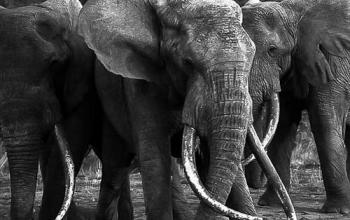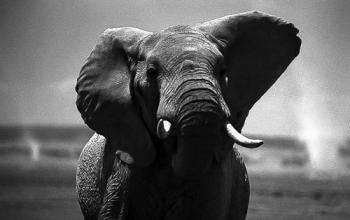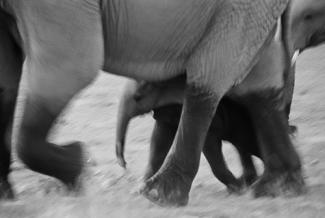
Whoever has seen these giants marching across the last free open spaces of the world knows that this is something that must not be lost.
Romain Gary, The Roots of Heaven

We approached many magazine and news outlets to write about the resurgent poaching issue in 2009 and 2010, but it was Vanity Fair that finally understood the enormous implications of what was occurring across the continent. It took five months of talks, but they finally said they would cover it. In November 2010, they sent the gifted Alex Shoumatoff, who covered the death of Diane Fossey, to Africa to write Agony and Ivory, one of the most scorching and all-encompassing articles on a single species in the history of journalism. In it, Alex mentions the stirrings of an extinction vortex that, like a modern-day Scylla and Carybdis, was swallowing the last great herds of Africa. The article went viral and galvanized the world. National Geographic followed 14 months later with their heart-wrenching cover story Blood Ivory by Bryan Christy, which further galvanized the planet to a reality that has now plunged a stake in the conscience of the world, the slaughter of the innocents. The searing image of a rotting body was a wake-up call to the world that this action and thousands like it hold a mirror to humanity at its most depraved and barbaric. A plethora of other articles and campaigns have since arisen around the world. The planet is now firmly entrenched in Battle for the Elephants, the documentary shown nationally in February and directed by John Heminway. What few realize is that the battle for the elephant is also a battle for the human soul. We walked out of Africa alongside elephants, they helped us find water in times of drought, and their bodies have fed us for countless millennia. We are indebted to the elephant as we are to few, perhaps no, other species in our evolution.

There are the realities of climate change too titanic to ignore, but the willful eradication of a part of our psyche that sits enthroned like a monument in the mind and soul of humanity cannot be ignored. It was Romain Gary who understood that the elephants were the last individuals. In his masterpiece The Roots of Heaven, he imagined prisoners in concentration camps closing their eyes and thinking of the elephants marching freely in the last open spaces of the world. He imagined them tearing down the barbed wire fences, reinforced concrete, and abject materialism of the camps and stepping over the SS soldiers. For make no mistake, if we were to lose the elephants, the ramifications would be a penal colony on our planet, not just for humanity but for the entire life force. It is why Elie Wiesel told us that to save the elephant "is an urgent moral imperative." The March for the Elephants is also a march for the sea and the rainforests and the frogs and the lions and tigers and bears. It is a march for what makes life ineffable. This was summarized by a ranger in Tsavo who worked for the orphaned elephants Dame Daphne has worked so tirelessly to rehabilitate. He had lost his grandfather to an elephant years ago and yet was not vindictive. He realized it was an accident and that elephants are losing ancient ancestral migration paths and habitat. In his wonderfully stark, elegant face and camouflage fatigues he turned to us and said, "A world without elephants is like a world without oxygen."

"On an entirely manmade earth, there can be no room for man either," wrote Romain Gary. "All that will be left of us are robots."
Already there are stirrings of a realization in the Orient, stirrings in the minds and hearts, that elephants have to be killed to retrieve their tusks, that tusks do not fall out like milk teeth! How they do not realize the truth is one of the great mysteries of the human condition and illumines the great cultural gap between East and West. Perhaps they are willfully ignorant and choose to ignore the diabolical realities. But there is evidence that with the media campaigns and billboards through International Fund for Animal Welfare, WildAid and other agencies, the Chinese may be finally coming to grips with the grotesque idea that elephants have to have their faces sawed off to get at their teeth. Compared to just a year ago, many more are saying that they don't want to buy ivory. Maybe the campaigns are starting to impact the great civilization of Lao Tze. The great dijjaga tusker in India who was out of control bowed before the stalwart heart and mind of the Buddha. It is a lesson we should learn before it is too late.
Lose the elephant and you lose a firmament in the imagination of childhood. Lose the elephant and an entire foundation in the moral standing of civilization crumbles. All our human constructs and artifacts would pale before the loss of these titans. With the last elephants still marching on African soil, we may still have reason to walk toward the absolute horizon. The march this October is not only to salvage the elephant, but to salvage what is left of humanity's humanity. It is a march for sanity. Without the elephants, we become ontological cripples for the rest of our earthly stay. The elephant's future is our fate and responsibility. Without elephants we won't have a leg to stand on. Civilization will stand or fall on the back of the African elephant.
All images are copyright protected and may not be used without permission. All photos are courtesy of Cyril Christo and Marie Wilkinson.